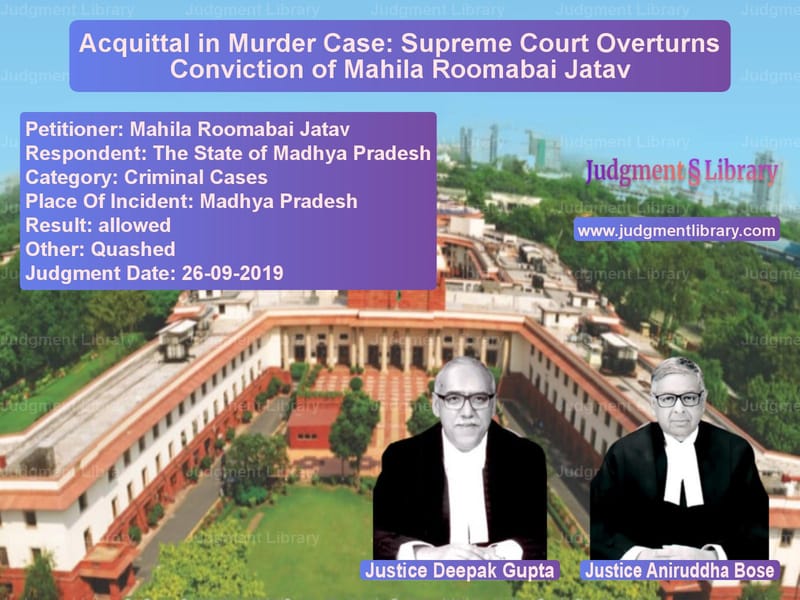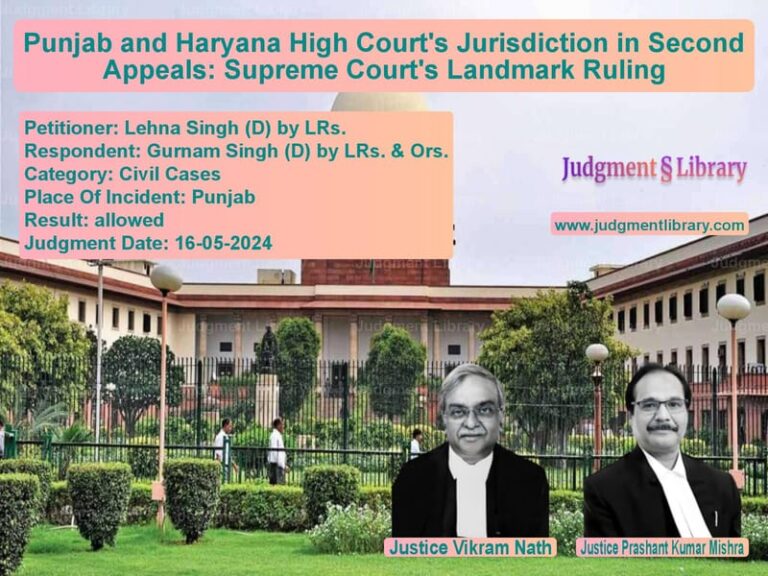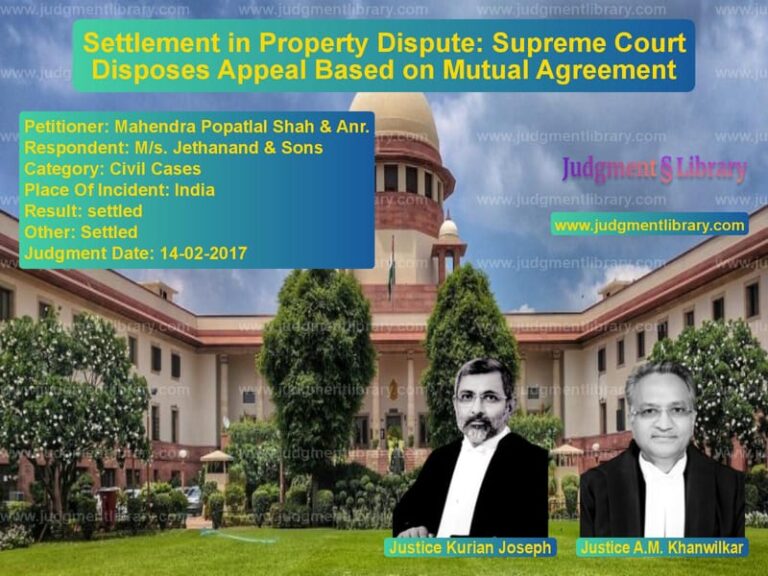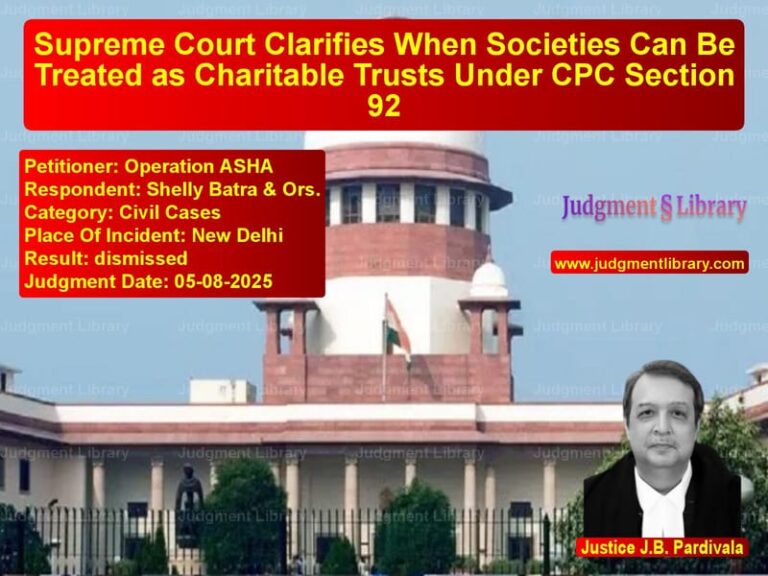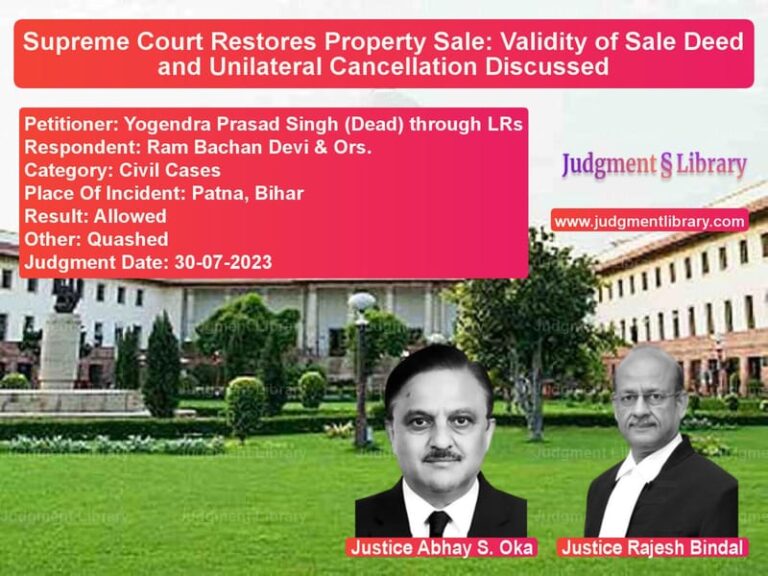Acquittal in Murder Case: Supreme Court Overturns Conviction of Mahila Roomabai Jatav
The case of Mahila Roomabai Jatav v. The State of Madhya Pradesh is a significant criminal appeal in which the Supreme Court overturned the conviction of the appellant, who was previously sentenced under Sections 302 and 120B of the Indian Penal Code (IPC). This judgment highlights the crucial role of circumstantial evidence in criminal trials and reinforces the principle that suspicion, however strong, cannot substitute proof.
Background of the Case
The case dates back to March 13, 1995, when the deceased, Shivcharan, went missing. He was last seen leaving his home with his wife, the appellant Mahila Roomabai Jatav, around 3:00 am. His body was later found in a well nearly one kilometer away from their house. The prosecution alleged that the appellant, in collusion with her alleged lover Ramesh, murdered her husband.
Based on circumstantial evidence and an alleged extra-judicial confession, the Trial Court convicted both Roomabai and Ramesh. The High Court later acquitted Ramesh due to lack of evidence but upheld Roomabai’s conviction. She was sentenced to life imprisonment under Sections 302 and 120B of the IPC and five years under Section 201 for destruction of evidence.
Prosecution’s Arguments
The prosecution relied on the following key circumstantial evidence:
- Motive: The appellant was allegedly involved in an illicit relationship with Ramesh, which led to the murder of her husband.
- Last Seen Theory: PW1, Chironji Jatav (brother of the deceased), claimed to have seen Roomabai leaving the house with Shivcharan early in the morning.
- Extra-Judicial Confession: It was alleged that Roomabai confessed to the murder, stating that Ramesh killed Shivcharan and disposed of the body.
- Recovery of Murder Weapon: An axe with bloodstains was allegedly recovered from Roomabai’s house.
Defense’s Arguments
The defense countered these claims, stating:
- No Direct Evidence: There were no eyewitnesses to the crime, and the case was purely based on circumstantial evidence.
- Weak Motive: The defense argued that just a day before the incident, the deceased was seen peacefully coexisting with Roomabai and Ramesh, which contradicts the theory that she conspired to kill him.
- Unreliable Last Seen Theory: The sole witness, PW1, admitted in cross-examination that he had been living separately from the deceased for six years. Additionally, he had a strained relationship with the appellant.
- Inadmissibility of Confession: The alleged confession was weak as it implicated Ramesh, who was later acquitted.
- Doubtful Recovery of Weapon: The axe recovered from the appellant’s house was not proven to be used in the crime.
Supreme Court’s Observations
The Supreme Court emphasized that circumstantial evidence must form an unbroken chain leading to only one conclusion—the guilt of the accused. If any possibility of another person committing the crime exists, the benefit of doubt must be given to the accused.
The Court analyzed the four key circumstantial evidence claims:
- Motive: The Court found the prosecution’s motive theory unconvincing. The fact that the deceased was seen with both the accused and the appellant just a day before the incident suggested no immediate tension.
- Last Seen Theory: The Court noted that seeing a husband and wife together before the husband’s death is not unusual. The burden of proof lay on the prosecution to establish that Roomabai was responsible for the murder.
- Recovery of Murder Weapon: The prosecution’s case was weak as there were no independent witnesses to confirm the recovery.
- Extra-Judicial Confession: Since Ramesh was acquitted, the confession lost credibility.
The Supreme Court stated: “We, therefore, are left only with one circumstance of last seen and we do not feel this circumstance alone is sufficient to hold the accused guilty of the offences of which she has been convicted.”
Final Verdict
The Supreme Court allowed the appeal, set aside the conviction, and acquitted the appellant. The Court ruled that the evidence presented did not meet the threshold required to sustain a conviction.
Key Takeaways:
- Suspicion cannot replace proof in criminal cases.
- Circumstantial evidence must conclusively establish guilt.
- The benefit of doubt must always go to the accused.
This judgment serves as a reminder of the fundamental principles of criminal law, ensuring that justice is served only when guilt is proven beyond a reasonable doubt.
Petitioner Name: Mahila Roomabai Jatav.Respondent Name: The State of Madhya Pradesh.Judgment By: Justice Deepak Gupta, Justice Aniruddha Bose.Place Of Incident: Madhya Pradesh.Judgment Date: 26-09-2019.
Don’t miss out on the full details! Download the complete judgment in PDF format below and gain valuable insights instantly!
Download Judgment: Mahila Roomabai Jata vs The State of Madhya Supreme Court of India Judgment Dated 26-09-2019.pdf
Direct Downlaod Judgment: Direct downlaod this Judgment
See all petitions in Murder Cases
See all petitions in Bail and Anticipatory Bail
See all petitions in Judgment by Deepak Gupta
See all petitions in Judgment by Aniruddha Bose
See all petitions in allowed
See all petitions in Quashed
See all petitions in supreme court of India judgments September 2019
See all petitions in 2019 judgments
See all posts in Criminal Cases Category
See all allowed petitions in Criminal Cases Category
See all Dismissed petitions in Criminal Cases Category
See all partially allowed petitions in Criminal Cases Category

